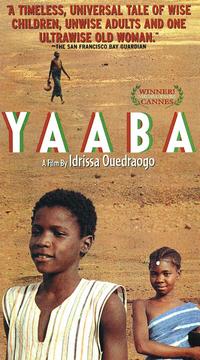fiction.wikisort.org - Movie
Yaaba is a 1989 Burkinabé drama film written, produced, and directed by Idrissa Ouedraogo, "one of the best known films from francophone sub-Saharan Africa".[1] It won the Sakura Gold prize at the 1989 Tokyo Film Festival.[2] The film was selected as the Burkinabé entry for the Best Foreign Language Film at the 62nd Academy Awards, but was not accepted as a nominee.[3]
| Yaaba | |
|---|---|
 Film poster | |
| Directed by | Idrissa Ouedraogo |
| Written by | Idrissa Ouedraogo |
| Screenplay by | Idrissa Ouédraogo |
| Produced by | Arcadia Films, Les Films de l'avenir, Télévision suisse romande, Thelma Film AG |
| Starring | Fatimata Sanga, Noufou Ouedraogo, Roukietou Barry, Adama Ouedraogo, Amadé Tour |
| Cinematography | Matthias Kälin |
| Edited by | Loredana Cristelli |
| Music by | Francis Bebey |
| Distributed by | New Yorker Films (U.S.) |
Release date |
|
Running time | 90 minutes |
| Countries | Burkina Faso Switzerland France |
| Language | Mòoré |
| Box office | $55,000 |
The film was the subject of a short documentary Parlons Grand-mère, which was shot during the film's production by Djibril Diop Mambéty.
Plot
In a Mossi village in Burkina Faso, Bila (Noufou Ouédraogo), a ten-year-old boy, makes friends with an old woman called Sana (Fatimata Sanga), who has been accused of witchcraft by her village, and has become a social outcast. Only Bila is respectful of her, and calls her yaaba (Grandmother).
When Bila's cousin, Nopoko (Roukietou Barry), falls ill, a medicine man insists that Sana has stolen the girl's soul. Sana undergoes a long and gruelling but ultimately successful journey to find a medicine to save Nopoko's life, but is still treated as a witch.
After Sana dies, the real reason why she is hated in the village is uncovered, but the love and wisdom she invested in Bila and Nopoko lives on.
Awards
- FIPRESCI Prize (Cannes, 1989)
See also
- List of submissions to the 62nd Academy Awards for Best Foreign Language Film
- List of Sub-Saharan African submissions for the Academy Award for Best Foreign Language Film
References
- Teresa Hoefert de Turégano (2004). African Cinema and Europe: Close-up on Burkina Faso. European Press Academic Pub. pp. 175–180. ISBN 978-88-8398-031-2.
- "Tokyo film festival gives big cash awards". chron.com. Retrieved 2011-08-23.
- Margaret Herrick Library, Academy of Motion Picture Arts and Sciences
External links
- Yaaba at IMDb
- Yaaba at AllMovie
- Cinema Then, Cinema Now: Yaaba a 1994 discussion of the film hosted by Jerry Carlson of CUNY TV
Другой контент может иметь иную лицензию. Перед использованием материалов сайта WikiSort.org внимательно изучите правила лицензирования конкретных элементов наполнения сайта.
WikiSort.org - проект по пересортировке и дополнению контента Википедии